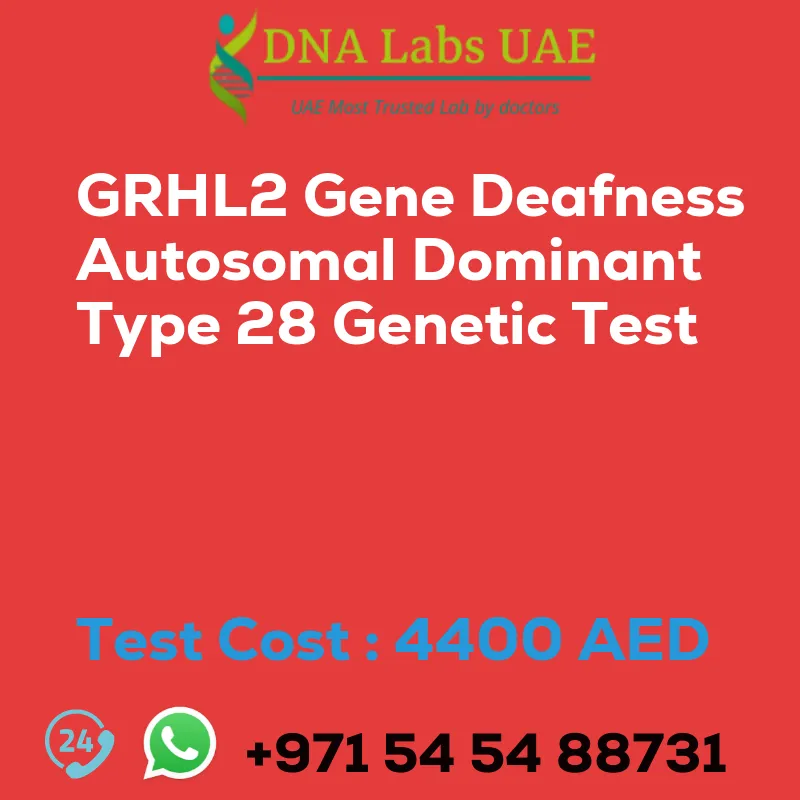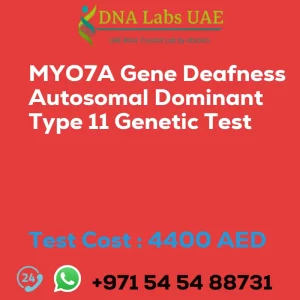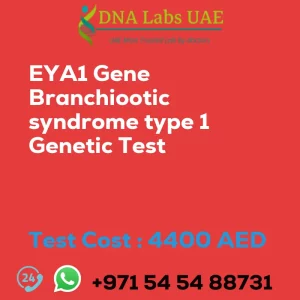GRHL2 Gene Deafness autosomal dominant type 28 Genetic Test
Welcome to DNA Labs UAE, where we offer the GRHL2 Gene Deafness autosomal dominant type 28 Genetic Test. This test is designed to diagnose and provide valuable information for individuals with autosomal dominant type 28 (DFNA28) deafness. Let’s dive into the details:
Test Components
The GRHL2 Gene Deafness autosomal dominant type 28 Genetic Test is priced at 4400.0 AED. The sample condition required for this test includes blood, extracted DNA, or one drop of blood on FTA card.
Report Delivery
The report for the GRHL2 Gene Deafness autosomal dominant type 28 Genetic Test will be delivered within 3 to 4 weeks.
Method
The test utilizes Next-Generation Sequencing (NGS) technology to analyze the DNA sequence of the GRHL2 gene.
Test Type
The GRHL2 Gene Deafness autosomal dominant type 28 Genetic Test falls under the category of Ear Nose Throat Disorders.
Doctor
The test is conducted under the supervision of an ENT Doctor.
Test Department
The GRHL2 Gene Deafness autosomal dominant type 28 Genetic Test is conducted in the Genetics department.
Pre Test Information
Prior to taking the GRHL2 Gene Deafness autosomal dominant type 28 Genetic Test, it is important to provide the clinical history of the patient who is going for the PTPN23 Gene Ciliogenesis related disorder NGS Genetic DNA Test. Additionally, a Genetic Counselling session is recommended to draw a pedigree chart of family members affected with PTPN23 Gene Ciliogenesis related disorder NGS Genetic DNA Test gene PTPN25.
Test Details
The GRHL2 gene is associated with a form of deafness known as autosomal dominant type 28 (DFNA28). This type of deafness is inherited in an autosomal dominant pattern, meaning that an affected individual has a 50% chance of passing the condition on to their children.
The Next-Generation Sequencing (NGS) genetic test for GRHL2 gene deafness, autosomal dominant type 28 is a type of genetic test that uses advanced sequencing technology to analyze the DNA sequence of the GRHL2 gene. This test can identify any mutations or variations in the gene that may be associated with DFNA28.
The NGS genetic test for GRHL2 gene deafness, autosomal dominant type 28 can help in diagnosing individuals with this specific form of deafness and can also be used for carrier testing in individuals with a family history of DFNA28. It can provide valuable information for genetic counseling and management of the condition.
It’s important to note that genetic testing should be done under the guidance of a healthcare professional or genetic counselor who can interpret the results and provide appropriate recommendations.
| Test Name | GRHL2 Gene Deafness autosomal dominant type 28 Genetic Test |
|---|---|
| Components | |
| Price | 4400.0 AED |
| Sample Condition | Blood or Extracted DNA or One drop Blood on FTA Card |
| Report Delivery | 3 to 4 Weeks |
| Method | NGS Technology |
| Test type | Ear Nose Throat Disorders |
| Doctor | ENT Doctor |
| Test Department: | Genetics |
| Pre Test Information | Clinical History of Patient who is going for PTPN23 Gene Ciliogenesis related disorder NGS Genetic DNA Test. A Genetic Counselling session to draw a pedigree chart of family members affected with PTPN23 Gene Ciliogenesis related disorder NGS Genetic DNA Test gene PTPN25 |
| Test Details |
The GRHL2 gene is associated with a form of deafness known as autosomal dominant type 28 (DFNA28). This type of deafness is inherited in an autosomal dominant pattern, meaning that an affected individual has a 50% chance of passing the condition on to their children. A Next-Generation Sequencing (NGS) genetic test for GRHL2 gene deafness, autosomal dominant type 28 is a type of genetic test that uses advanced sequencing technology to analyze the DNA sequence of the GRHL2 gene. This test can identify any mutations or variations in the gene that may be associated with DFNA28. The NGS genetic test for GRHL2 gene deafness, autosomal dominant type 28 can help in diagnosing individuals with this specific form of deafness and can also be used for carrier testing in individuals with a family history of DFNA28. It can provide valuable information for genetic counseling and management of the condition. It’s important to note that genetic testing should be done under the guidance of a healthcare professional or genetic counselor who can interpret the results and provide appropriate recommendations. |







